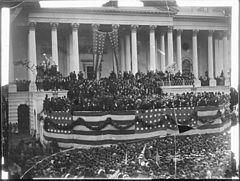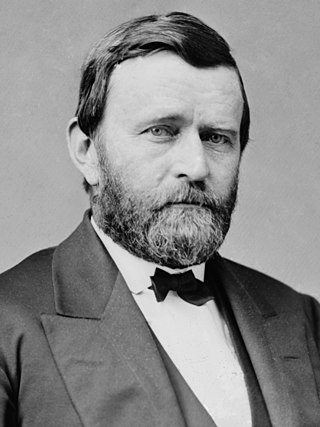
The 1868 United States presidential election was the 21st quadrennial presidential election, held on Tuesday, November 3, 1868. In the first election of the Reconstruction Era, Republican nominee Ulysses S. Grant defeated Horatio Seymour of the Democratic Party. It was the first presidential election to take place after the conclusion of the American Civil War and the abolition of slavery. It was the first election in which African Americans could vote in the reconstructed Southern states, in accordance with the First Reconstruction Act.

Schuyler Colfax was an American journalist, businessman, and politician who served as the 17th Vice President of the United States from 1869 to 1873, and prior to that as the 25th Speaker of the House of Representatives from 1863 to 1869. Originally a Whig, then part of the short-lived People's Party of Indiana, and later a Republican, he was the U.S. Representative for Indiana's 9th congressional district from 1855 to 1869.
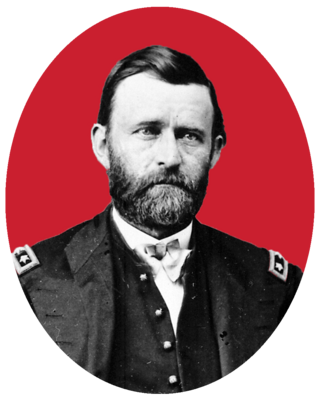
The 1868 Republican National Convention of the Republican Party of the United States was held in Crosby's Opera House, Chicago, Cook County, Illinois, on May 20 to May 21, 1868. Ulysses S. Grant won the election and became the 18th president of the United States.

Between 73 and 79 days after the presidential election, the president-elect of the United States is inaugurated as president by taking the presidential oath of office. The inauguration takes place for each new presidential term, even if the president is continuing in office for a second term.

The 1872 Republican National Convention was held in Philadelphia, Pennsylvania, June 5–6, 1872. President Ulysses S. Grant was unanimously nominated for reelection by the convention's 752 delegates. Massachusetts Senator Henry Wilson replaced sitting Vice President Schuyler Colfax as the Republican vice presidential nominee.

Ellen Maria Wade Colfax was the second wife of Schuyler Colfax, who became the first House speaker to be elected vice president when he ran on a ticket headed by Ulysses S. Grant in 1868. She was born in Andover, Ohio in 1836.
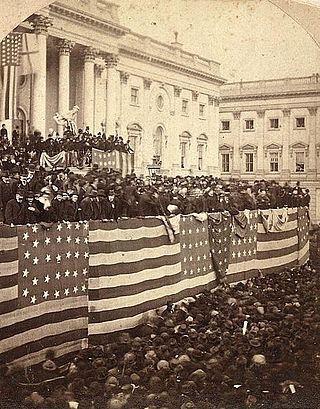
The inauguration of Rutherford B. Hayes as the 19th president of the United States took place publicly on Monday, March 5, 1877, at the East Portico of the United States Capitol in Washington, D.C. This was the 23rd inauguration and marked the commencement of the only four-year term of Rutherford B. Hayes as president and William A. Wheeler as vice president.

The second inauguration of Ulysses S. Grant as president of the United States was held on Tuesday, March 4, 1873, at the East Portico of the United States Capitol in Washington, D.C. This was the 22nd inauguration and marked the commencement of the second and final four-year term of Ulysses S. Grant as president and the only term of Henry Wilson as vice president. Chief Justice Salmon P. Chase administered the presidential oath of office. This was one of the coldest inaugurations in U.S. history with 16 °F (−9 °C) at noon, and the inaugural ball ended early when the food froze. Vice President Wilson died 2 years, 263 days into this term, and the office remained vacant since there was no constitutional provision to fill an intra-term vice-presidential vacancy until the Twenty-fifth Amendment in 1967.

The second inauguration of Woodrow Wilson as president of the United States was held privately on Sunday, March 4, 1917, at the President's Room inside the United States Capitol in Washington, D.C., and publicly on Monday, March 5, 1917, at the East Portico of the Capitol. This was the 33rd inauguration and marked the commencement of the second and final four-year term of both Woodrow Wilson as president and Thomas R. Marshall as vice president. Chief Justice Edward D. White administered the presidential oath of office to Wilson.
Events from the year 1869 in the United States.

The presidency of Ulysses S. Grant began on March 4, 1869, when Ulysses S. Grant was inaugurated as the 18th president of the United States, and ended on March 4, 1877. The Reconstruction era took place during Grant's two terms of office. The Ku Klux Klan caused widespread violence throughout the South against African Americans. By 1870, all former Confederate states had been readmitted into the United States and were represented in Congress. However, Democrats and former slave owners refused to accept that freedmen were citizens who were granted suffrage by the Fifteenth Amendment, which prompted Congress to pass three Force Acts to allow the federal government to intervene when states failed to protect former slaves' rights. Following an escalation of Klan violence in the late 1860s, Grant and his attorney general, Amos T. Akerman, head of the newly created Department of Justice, began a crackdown on Klan activity in the South, starting in South Carolina, where Grant sent federal troops to capture Klan members. This led the Klan to demobilize and helped ensure fair elections in 1872.
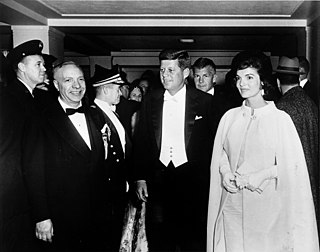
United States presidential inaugural balls are large social gatherings, both white tie and black tie, held to celebrate the commencement of a new term of the president of the United States. Planned and sanctioned by the Presidential Inaugural Committee, the official inaugural balls occur throughout the evening of Inauguration Day in the Washington D.C. area and are invitation-only, attended by guests who are issued pre-paid tickets. The president, first lady, vice president, and second lady or gentleman all make personal appearances at each of the inaugural balls held in their honor. Catered food, beverages, and live entertainment performed by national and globally acclaimed musicians are provided at the inaugural balls.

The 1868 United States presidential election in West Virginia took place on November 3, 1868, as part of the 1868 United States presidential election. West Virginia voters chose five representatives, or electors, to the Electoral College, who voted for president and vice president.

The 1868 United States presidential election in North Carolina took place on November 3, 1868, as part of the 1868 United States presidential election. North Carolina voters chose 9 representatives, or electors, to the Electoral College, who voted for president and vice president.

The 1868 United States presidential election in Nevada took place on November 3, 1868, as part of the 1868 United States presidential election. Nevada voters chose three representatives, or electors, to the Electoral College, who voted for president and vice president.

The 1868 United States presidential election in Nebraska took place on November 3, 1868, as part of the 1868 United States presidential election. State voters chose three representatives, or electors, to the Electoral College, who voted for president and vice president.

The 1868 United States presidential election in Missouri took place on November 3, 1868, as part of the 1868 United States presidential election. Voters chose 11 representatives, or electors, to the Electoral College, who voted for president and vice president.
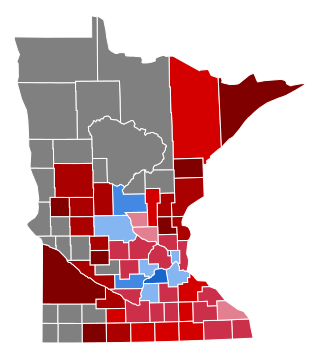
The 1868 United States presidential election in Minnesota took place on November 3, 1868, as part of the 1868 United States presidential election. State voters chose four representatives, or electors, to the Electoral College, who voted for president and vice president.
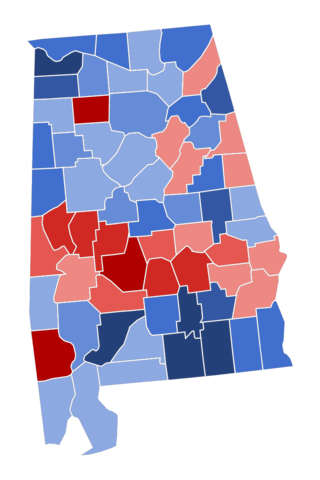
The 1868 United States presidential election in Alabama took place on November 3, 1868, as part of the 1868 presidential election. Alabama voters chose eight representatives, or electors, to the Electoral College, who voted for president and vice president.

In 1868, the Democrats nominated former New York Governor Horatio Seymour for President and Francis Preston Blair Jr. for Vice President. The Seymour-Blair ticket ran on a platform which supported national reconciliation and states' rights, opposed Reconstruction, and opposed both Black equality and Black suffrage. Meanwhile, the Republican presidential ticket led by General Ulysses S. Grant benefited from Grant's status as a war hero and ran on a pro-Reconstruction platform. Ultimately, the Seymour-Blair ticket ended up losing to the Republican ticket of General Ulysses S. Grant and House Speaker Schuyler Colfax in the 1868 U.S. presidential election.
